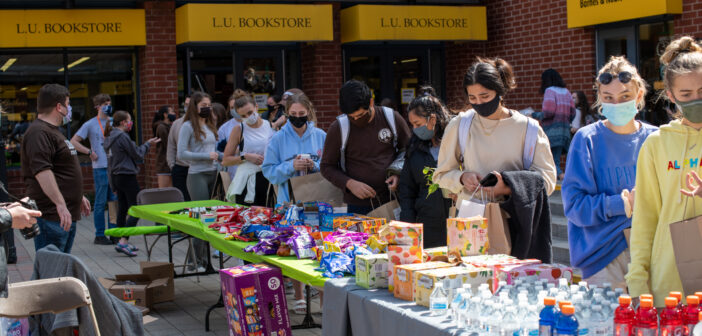“Dear Self: It’s a shame how hard you are on yourself. You treat others with more love than you treat you. You deserve to be celebrated too.”
This quote by musical artist and poet Reyna Biddy sits atop the website created for Lehigh University’s Wellness Week, held from March 22 to March 26. It was a time provided by the university intended for students and faculty to refresh and recharge from the stressors of life in the midst of an unconventional semester.
In lieu of spring break, which was removed from the spring 2021 academic calendar in October to discourage student travel amid the pandemic, numerous student organizations and university offices around campus held events and programs that promoted the mental and physical well-being of students and faculty while emphasizing the importance of self-care.
Among the organizations involved were the Pride Center, Lehigh Dining, University Counseling and Psychological Services, the Office of Student Engagement, The Center for Gender Equity, Black Student Union and Lehigh After Dark.
Nick Christy, assistant director of student engagement and student center facilities, said the goal of these events was to provide opportunities for students to take their minds off of everything going on by facilitating fun activities that connect the campus community in a safe and healthy way.
“Because Lehigh students are so committed to the work in a way that’s so admirable, I think it’s hard sometimes to take a break and recognize that need to provide self-care for yourself,” Christy said. “I think it’s important for all of us to really take that beat and say ‘okay what am I doing to make sure I can recharge and be at my best self.’”
Christy said one of the most successful Wellness Week activities he witnessed was the “Me/We Bag” event held in Farrington Square on March 23 by the Office of Student Engagement.
The event allowed students to both make a self-care package for themselves as well as for someone else, with the idea that in taking care of yourself it’s also important to check-in on other people to make sure everyone collectively is taking care of each other, Christy said.
Madie Schulte, ‘22, was also impressed with the turnout of events held this week and said the university did a fantastic job of preparing and advertising the week to students and faculty.
Schulte serves as the marketing chair of the National Alliance on Mental Illness, a club on campus that spreads awareness and attempts to destigmatize mental illness in order to create a more comfortable and accepting environment within the university.
She said she helped organize the “Destress with Paint” event in coordination with Student Senate, which allowed students to pick up paint kits in Farrington Square on March 24. The kits were later used in a Zoom session that taught students about the importance of mental health.
Another component of Wellness Week was the academic adjustments offered to some students. Some professors cancelled classes, others withheld learning new content or incorporated more informal interactions, such as group discussions or individual meetings.
Susan Kart, assistant professor of African Art, held one-on-one meetings with her Global Contemporary Art (ART 221) students to check-in and discuss their independent projects rather than holding classes this week.
“(It has) been fun for me to check-in with (my students) halfway through the semester because digitally I don’t get to see all of them,” Kart said. “Sometimes they have their screens off or they have poor connection which makes it difficult to make connections during class, so it’s been a good way to touch base with everyone to see how they are all holding up.”
Kart said she is appreciative that the university realized it’s not reasonable for students and faculty to go 15 weeks straight through without a break in a full-time online curriculum.
“It’s really important to acknowledge that in an extraordinary year, we don’t expect to keep forcing people to do extraordinary things,” Kart said.
Lehigh’s Counseling and Psychological Services also played a large role in the foundation of Wellness Week, hosting many events as part of its “from here (& now) with LUv” series that focused on the importance of physical and mental wellness.
Briana Luppino, staff psychologist and outreach coordinator of Counseling and Psychological Services, said the center’s goal while planning its Wellness Week activities was to prioritize student and faculty mindfulness. She said this week gave people the opportunity to connect with themselves and their inner-world by taking a moment to stop and reflect, while also being able to connect with others.
“Connection feels different and strange in a COVID world, so figuring out how to be present, non-judgemental and open to internal experiences could help benefit your well-being,” Luppino said.
Two of the Counseling Center’s most successful events from the week “Reflect & Reconnect” and “Live Better with Stress” were actually events that run every week, Luppino said. She thinks the reason for the large turnout at these events is that the week persuaded people to try new things with the extra time some were granted as a result of a decreased course load.
“Hopefully if people found it helpful, now they know that space is there every single week with the Counseling Center so they could just drop back in,” Luppino said. “Reflection, mindfulness and connecting with other people doesn’t have to end even though Wellness Week is over.”
Though Wellness Week intended to relieve stress for the Lehigh community, some students felt the university could have done a better job enforcing the break, since not all students were granted time off.
“As great as the idea of Wellness Week was, I do know a few people who really didn’t get a break because professors didn’t take it seriously and I don’t think the school enforced it as much as they should have or emphasized the importance of it,” Schulte said.
Moving forward, Schulte recommends the university give wellness days, or days where classes are cancelled for all students, sporadically throughout the semester to give people a chance to recharge.
In the future, Kart said she would like to see something similar to Wellness Week happen at Lehigh for years to come. Kart envisions instead of having a spring break, there would be a week with more in-person activities such as yoga workshops, cooking classes and more.
“It would be really nice for there to be a semi-structured week where the regular routine was broken, but there were still productive, healthy, thoughtful things to be doing and engaging with on campus,” Kart said. “I think that would be a lovely way to spend a break.”
Though Wellness Week sprung up mixed reactions across campus, Luppino said it’s the lessons learned amid living through a pandemic and the newfound emphasis on mental health that are most important to reflect on.
“I feel hopeful that this was a spark that we need to think about health as more than just your physical health and well-being as more than just ‘are you getting good grades’ but ‘are you taking care of yourself fully—spiritually, mentally, physically, emotionally, intellectually’—and I feel hopeful that we’re gonna stay on that even after COVID numbers go down.”
To stay updated on events and resources held by Counseling and Psychological Services, visit its website or follow its Instagram account @lehigh_ucps.






Comment policy
Comments posted to The Brown and White website are reviewed by a moderator before being approved. Incendiary speech or harassing language, including comments targeted at individuals, may be deemed unacceptable and not published. Spam and other soliciting will also be declined.
The Brown and White also reserves the right to not publish entirely anonymous comments.